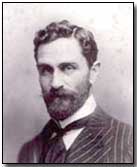Who's Who - Sir Roger Casement
 Sir Roger David Casement
(1864-1916), the British traitor and Irish nationalist hero, was hanged by
the British in mid-1916 for his part in working with Germany and Irish
nationalists in planning the Dublin
Easter Rising of 1916.
Sir Roger David Casement
(1864-1916), the British traitor and Irish nationalist hero, was hanged by
the British in mid-1916 for his part in working with Germany and Irish
nationalists in planning the Dublin
Easter Rising of 1916.
Born in Dublin on 1 September 1864 the son of a Protestant father and Catholic mother, Casement served for many years as a distinguished British Consul in Mozambique, Angola, the Congo Free State and Brazil.
He gained international renown for his Consular reports criticising the treatment of native workers in the Congo and Amazon. As a consequence of his reports Belgium notably overhauled its administration of the Congo in 1908. Casement himself was rewarded with a knighthood in 1911, the same year he retired from the diplomatic service in ill-health and established himself in Dublin.
Casement helped to form in 1913 the Irish National Volunteers, a nationalist organisation. The following year, in July 1914, Casement visited New York in an attempt to garner support for the organisation. With the outbreak of war the following month Casement similarly hoped for German assistance in gaining Irish independence from Britain.
With this in mind Casement travelled to Berlin in November 1914; once there however he found the Germans reluctant to undertake the risk of sending forces to Ireland. He was also disappointed in his hopes of recruiting to his cause Irish prisoners taken to Germany.
While in Germany Casement strove in particular to effectively borrow a number of German officers to assist with a planned Easter rising in Dublin; again, he was disappointed. Believing the planned rising unlikely to succeed at that stage Casement arranged to be taken by German submarine to Ireland where he hoped to dissuade nationalist leaders from undertaking rebellion for the present.
Consequently he was landed near Tralee in County Kerry on 12 April 1916. Twelve days later he was arrested by the British, taken to London, and charged with treason. At about this time copies of a diary (the 'Black Diary') reputed to be written by Casement were circulated among government officials, detailing alleged homosexual practices with native boys.
Although clearly an attempt by the British to discredit Casement the diaries' authenticity was verified by an independent panel of scholars in 1959 and, more recently, in 2002. With an appeal dismissed Casement was taken to Pentonville Prison in London where he was hanged on 3 August 1916.
In 1965 Casement's remains were returned to Dublin and afforded a state funeral; they were then re-interred in Dublin.
Click here to read Casement's speech following his conviction on 29 June 1916; click here to read the British government's reaction to news of the conviction.
The Austro-Hungarian declaration of war was the first ever delivered by telegram.
- Did you know?
